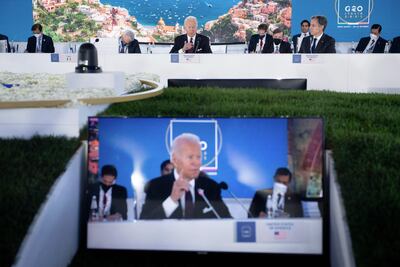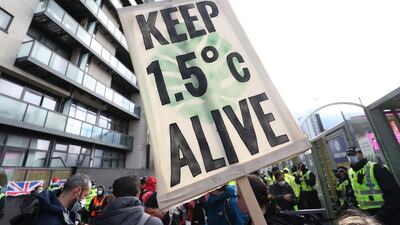Members of the G20 have failed to follow through on ambitious climate pledges made at the Cop26 climate summit in Glasgow, a report has found.
Global leaders and climate activists gathered in the Scottish city last year where they agreed on steps to reach net neutrality and limit global warming to 1.5°C above pre-industrial levels.
But a report by research group BloombergNEF found that no G20 member had introduced sufficient policies to reduce greenhouse emissions by enough to achieve "deep decarbonisation".
Developed nations are some of the world's biggest polluters and are responsible for about 80 per cent of global emissions, the Policy Scoreboard report released on Monday says.
The scoreboard devised by BNEF rated each G20 member – 19 countries and the European Union – on six climate policy issues and examined annual progress in each. BNEF says its findings showed "plenty of room for improvement".
Efforts to decarbonise the power and transport industries have been reasonably successful but progress in areas such as building and industrial carbon capture, in addition to the renewable 'circular economy', has been much slower, BNEF researchers say.
The scorecard rating were based on the levels of government support, the robustness of the policy-making response and metrics to gauge change.
A total of 11 out of the 19 nations upped their total scores this year, with an average for the whole group of 52 per cent out of 100 per cent – up 1 percentage point from last year.
Germany, France and the UK improved their scores by an average of three points when it came to addressing greenhouse emissions,
But the score for other Organisation for Economic Co-operation and Development nations, including South Korea, Japan and Australia, fell. The score for this group fell by 2 percentage points, to an average of 52 per cent – 25 points fewer than the top performers.

At the bottom of the G20 table, developing economies had an average score of 36 per cent. The group did improve from last year – by an average of 2 percentage points – led by India and South Africa.
“Government pledges often get the headlines and promises made around Cop26 last year were impressive,” said BNEF head of policy Victoria Cuming. “But talk is cheap – none of the G20 countries has implemented sufficient concrete incentives and regulations to achieve what’s been promised.”
The research found that due to the crisis in Ukraine, policymakers have shifted their attention to energy security. The report found this compatible with carbon-cutting measures, such as a focus on renewables, electrification, low-carbon fuels and energy efficiency.
“Words only matter if they’re backed up with action – and the dangerous reality is, none of the G20 countries are delivering the emissions cuts they’ve promised fast enough," said Michael Bloomberg, UN Secretary General’s Special Envoy for Climate Ambition.
"This report helps to provide transparency into countries’ progress so that the public can hold leaders accountable and highlights policies governments can deploy to reach and exceed the pledges they’ve made.”


